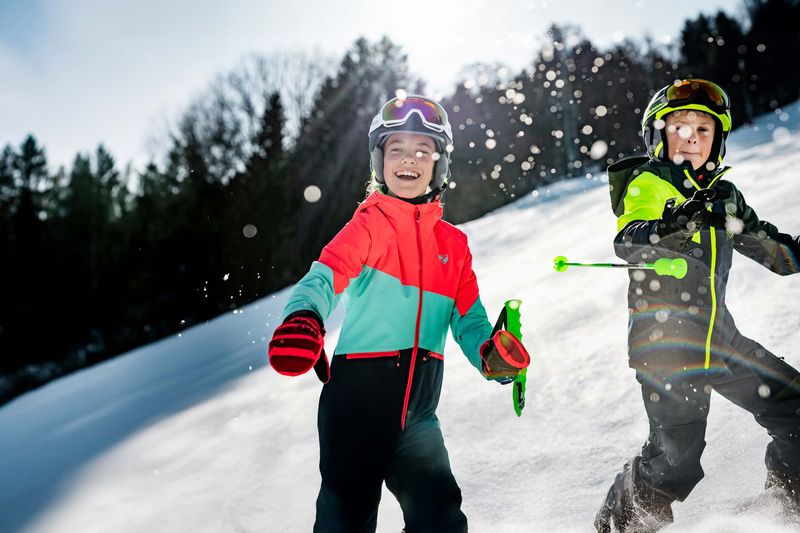Contents
The Right Ski Gear for Kids: What Parents Should Know
For many families, skiing is the highlight of winter. But for parents, it's not just about fun – it’s also about keeping their little ones safe. The right equipment helps protect your kids from injuries and ensures they can hit the slopes with confidence. But what gear is truly essential to make their first ski experience safe and enjoyable?
Essential Head Protection
Safety starts with a properly fitting helmet and high-quality ski goggles. A ski helmet should meet the EN 1077 standard and fit snugly. 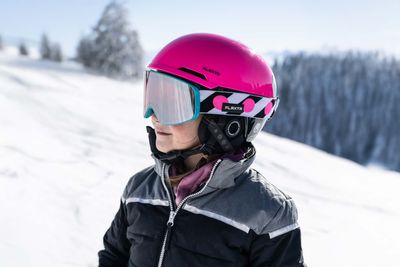
To find the right size, measure your child's head circumference with a tape measure and compare it with the manufacturer's size guide. The helmet should fit securely without pinching and should not shift when the child shakes their head.
Ski goggles are just as important as helmets, as they protect the eyes from UV rays, biting wind, and blowing snow while ensuring clear vision in all conditions. A well-fitting pair allows the kids to focus on their skiing without distraction.
>> Check out our children's ski goggles here!
>> And find our children's ski helmets here!
Back Protection for Extra Safety
Especially for beginners or those tackling fun parks, falls are inevitable. A protective vest helps cushion the back from impacts, adding an extra layer of safety on the slopes.
The best options feature viscoelastic foam, which molds to the body while remaining tough enough to absorb impact. Lightweight, breathable models provide additional comfort and freedom of movement.
>> Our protective vests are flexible and comfortable. Order online now!
Choosing the Right Skis
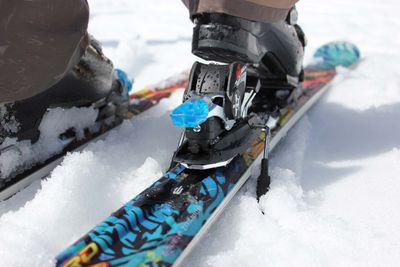
More experienced young skiers can benefit from longer models, like race skis or freeski options, which reach nose height and provide better stability.
Equally important is the proper adjustment of ski bindings. They must be set according to the child's weight to minimize the risk of injury in case of a fall.
Perfectly Fitting Ski Boots
Ski boots are the crucial link between skier and ski. A good fit is essential for control and safety on the slopes. Boots that are too loose make movements unstable, while overly tight boots can cause discomfort and pressure points.
Ideally, the child's toes should lightly touch the front of the boot when standing, but have some wiggle room when in ski stance. A snug heel fit is also important to ensure efficient power transfer and a secure feel. Regularly check the fit, as children’s feet grow quickly.
>> Browse our selection of children's ski boots!
Warm Hands, Strong Grip
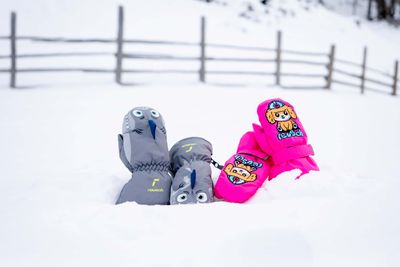
Mittens are best for younger kids as they retain warmth better, while finger gloves offer more dexterity – ideal for older children.
Look for waterproof and windproof materials, as well as a non-slip palm coating for extra grip. Additionally, adjustable wrist straps or elastic cuffs help keep snow out and ensure a snug, secure fit throughout the day.
>> Shop our children's ski gloves now!
Weatherproof and Easy to Spot
Layering is key to keeping kids warm and dry on the slopes.
Start with breathable thermal underwear, followed by an insulating fleece or wool layer. The outer layer should be a waterproof and windproof ski jacket and pants with snow guards to keep moisture and cold out.
For added safety, opt for bright colors to make sure your child is easily visible on the slopes.
>> Discover our high-quality children's ski clothing!
When to Introduce Ski Poles?
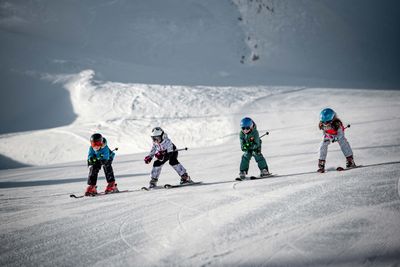
Only when your child can confidently stand on skis, make controlled turns, and maintain stability on different types of terrain do ski poles become a useful aid.
They provide extra support, improve balance, and help refine skiing techniques, especially on steeper slopes or when navigating more challenging runs. To ensure the poles are the correct length, you can use a simple rule of thumb:
Child’s height × 0.7
If you're still unsure and want to find the perfect pole length for your child, our ski pole configurator can help you find the perfect fit.
>> Ski poles for all ages – Browse now!
- Well-fitting ski helmet (EN 1077 certified)
- UV-protected ski goggles
- Protective vest for added safety in case of falls
- Correct ski length and properly adjusted bindings
- Well-fitting ski boots
- Waterproof, breathable ski gloves
- Thermal base layer, fleece, and waterproof ski clothing
- Bright colors and reflective details for visibility
- Ski poles only when the child is ready
- Regularly check and adjust equipment
Conclusion
With the right ski gear, your child will be ready for any slope, allowing you to relax and enjoy the fun too. Properly fitted skis, well-adjusted bindings, and weatherproof clothing ensure a safe and enjoyable skiing experience.
Now, it’s time to buckle up those skis, hit the slopes, and enjoy every moment!
>> Shop children's ski equipment now – for an unforgettable winter adventure!
